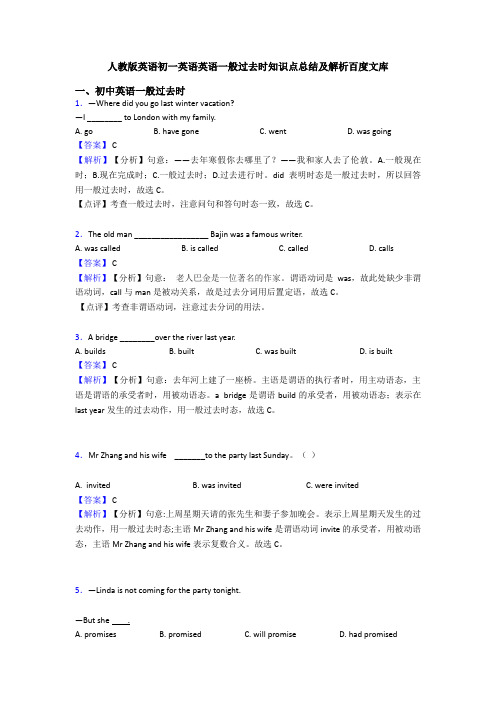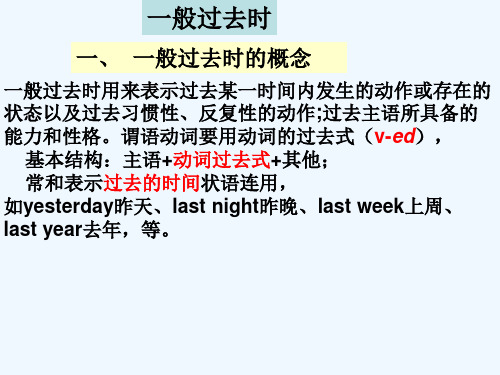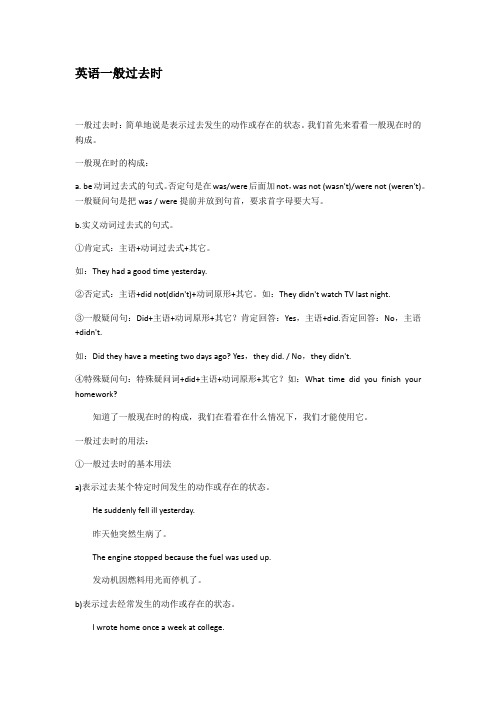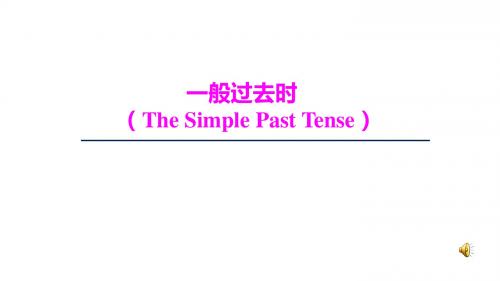人教版英语七年级下册初识一般过去时
初中英语人教版七年级下册一般过去时

新目标人教版英语七年级下册语法一般过去时科目:英语年级:七年级课题:一般过去时太平寨初级中学陈冬辉一、内容分析此内容为人教版七年级下册的一般过去时的语法课。
通过本课的学习,让学生掌握最基本的一般过去时的定义、结构、肯定句、否定句、一般疑问句、特殊疑问句形式和标志词及动词过去式的变化规则。
二、教学目标1. 知识目标掌握一般过去时的定义、结构、肯定句、否定句、一般疑问句、特殊疑问句形式和标志词及动词过去式的变化规则。
2. 能力目标掌握一般过去时的定义、结构、肯定句、否定句、一般疑问句、特殊疑问句形式和标志词及动词过去式的变化规则,并运用正确的英语语言进行练习巩固。
3. 情感目标培养学生运用一般过去时表达的交际能力和学习英语的兴趣,提高他们学习英语的主动性和积极性。
三、教学重点和难点重点:一般过去时及规则动词过去式的构成。
难点:不规则动词过去式的变化。
四、授课类型:新授课五、教学资源:课件六、教学过程(一)学习目标一般过去时(二)精彩导入让学生听歌曲《Yesterday Once More》中截取部分,When I was young. I'd listen to the radio. Waiting for my favorite songs. When they played I'd sing along. It make me smile. Those were such happy times and not so long ago.引出一般过去时。
(三)新授过程1、由歌曲中的句子I was young/they played/Those were suchhappy time总结一般过去时的概念。
一般过去时表示过去某个时间或某一段时间内发生的动作或存在的状态。
For exampleShe was at home yesterday.They were students one year ago.They worked in Beijing last year.2、继续观察上面的句子,总结一般过去时常用的时间状语。
英语人教版七年级下册走进“一般过去时”

走进“一般过去时”㈠【定义】:㈡【一般过去时的时间标志词】1. yesterda y 或以其构成的短语:yesterday morning (afternoon, evening)等;2. 由“last +一时间名词”构成的短语:last night, last year (winter, month, week)等;3. 由“时间段+ago ”构成的短语:a moment ago, two days ago, an hour ago 等;4. 其他:just now (刚才), this morning.㈢【一般过去时之be 动词】①be 动词的形式 (表示过去存在的状态) be 动词(is/ am/are )的过去式变化形式原形 am is are过去式 was waswere②含be 动词的句式变换规则: 肯定句 主语+was/were +其他. 例句:He/She was in Chengdu last year.否定句在was/were 后面加notHe/She wasn ’t in Chengdu last year. 一般疑问句 ----Was/were +主语+其他?--Yes , 主语+was/were ---No, 主语+wasn ’t/weren ’t ---Was he/she in Chengdu last year? --- Yes, he/she was. --- No, he/she wasn ’t. 特殊疑问句特殊疑问词+一般疑问句?Where was he/she last year?㈣【一般过去时之“行为动词”】① 规则动词的一般过去式的构成是在动词后面加ed .变化规律如下表:一般情况在动词末尾+edwalk--walked cook —cooked⊙一般过去时表示过去某个时间里发生的动作或状态;⊙过去习惯性、经常性的动作、行为;⊙过去主语所具备的能力和性格。
英语人教版七年级下册一般过去时教案

一般过去时的特殊疑问句由“疑问代词/疑问副词+一般疑问句”构成,具体可分为两种情况:
(1)主系表结构
疑问词+be +主语+……?
eg. Where were your brothers just now?刚才你的兄弟们在哪儿?
(2)主+谓(实义动词)+其他
疑问词+did+主语+……?
2.表示过去经常、反复发生的动作。
表示过去经常或反复发生的动作,常与always, usually, often, sometimes, never等时间状语连用。
eg. She always got up too late, and never had enough time for breakfast.
She looked very well when I last saw her.上次我见到她时,她看上去气色很好。
I received a strange letter yesterday. What a bad day I had!
昨天我接到一封奇怪的信。真是倒霉的一天。
The person you are looking for went away just now.你要找的人刚走。
在时间,条件,方式,让步状语从句中,表示过去将来的动作。
eg. She said she would come if I promised to wait for her.
她说如果我答应等她,她会来的。
I didn't know she would come until yesterday.我直到昨天才知道她要来。
Jim didn't go to school last Friday.上星期五吉姆没去上学。
人教版英语七年级下册Unit11初识一般过去时

初识一般过去时一、一般过去时态的概念及构造一般过去时主要表示过去发生的动作或存在的状态。
在句子中由主语+ 动词的过去式来表达。
如:(1) He walks to school. 〔一般现在时〕(2) He walked to school. 〔一般过去时〕句子(1)中动词walks是现在式〔即第三人称单数〕。
由于主语是第三人称单数的he,所以原形的walk后必须加上-s表示习惯性的、经常性的动作。
句意为:他经常步行上学。
而在句子(2)中,动词walked是过去式,过去式是表达过去事情的动词形式,因此这个句子是表示过去的某时,句意为:他曾经步行上学。
be动词的一般过去时:肯定句:主语+ be动词的过去式was / were +其他.否认句:主语+ be动词的过去式was / were + not +其他.疑问句:be动词的过去式Was / Were + 主语+ 其他?如:He was busy yesterday. 他昨天很忙。
〔肯定句〕He was not (wasn’t) busy yesterday. 他昨天不忙。
〔否认句〕Was he busy yesterday? 他昨天忙吗?〔一般疑问句〕行为动词的一般过去时:肯定句:主语+ 动词过去式+ 其他.否认句:主语+ 助动词did not / didn’t + 动词原形+ 其他.疑问句:助动词Did + 主语+ 动词原形+ 其他?注意:did是do的过去式,在这里是助动词,用来构成否认句和一般疑问句,与一般现在时中的do / does功能一样。
如:He played football last Sunday. 他上个星期天踢足球了。
〔肯定句〕He did not play football last Sunday. 他上个星期天没有踢足球。
〔否认句〕Did he play football last Sunday? 上个星期天他踢足球了吗?〔一般疑问句〕注意:行为动词的过去式没有人称和数的变化。
人教版初中英语七年级下册unit 11 过去式 知识点讲解与练习

人教版初中英语七年级下册unit 11 过去式知识点讲解与练习语法:一般过去时一、什么是一般过去时?一般过去时是用于表述“过去”的时态。
1. 表示过去发生的动作。
2. 表示过去发生的状态。
二、一般现在时与一般过去时的共同点一般过去时的句式在结构上与一般现在时的句式结构是完全相同的。
无论是陈述句还是疑问句均是如此。
因而学好了一般现在时的知识,再学习一般过去时的知识是非常容易的。
一、be动词。
1)肯定句。
I am a student. —> I was a student.You are young. —> You were young.2)否定句。
I am not a student. —> I was not a student.You are not young. —> You were not young.二、实意动词作谓语的情况。
1)肯定句。
I read books in the park. —> I read books in the park.(思考:为何看上去这个例句没有发生任何变化呢?答:因为read的过去式也为read,其拼写虽相同,但读音不同。
)He usually gets up at 7 a.m.—> He usually got up at 7 a.m.(注意:一般过去时中没有所谓的“三单变化规则”,因为一般过去时是没有人称和数的变化的)She helps me with my homework.—> She helped me with my homework.They want to ask you a question.—> They wanted to ask you a question.总结:此类结构中,将单独作谓语的实意动词变为其过去式,句子的时态即变成了一般过去时。
(实意动词单独作谓语的一般过去时没有人称和数的变化。
人教版英语初一英语英语一般过去时知识点总结及解析百度文库

人教版英语初一英语英语一般过去时知识点总结及解析百度文库一、初中英语一般过去时1.—Where did you go last winter vacation?—I ________ to London with my family.A. goB. have goneC. wentD. was going【答案】 C【解析】【分析】句意:——去年寒假你去哪里了?——我和家人去了伦敦。
A.一般现在时;B.现在完成时;C.一般过去时;D.过去进行时。
did表明时态是一般过去时,所以回答用一般过去时,故选C。
【点评】考查一般过去时,注意问句和答句时态一致,故选C。
2.The old man _________________ Bajin was a famous writer.A. was calledB. is calledC. calledD. calls【答案】 C【解析】【分析】句意:老人巴金是一位著名的作家。
谓语动词是was,故此处缺少非谓语动词,call与man是被动关系,故是过去分词用后置定语,故选C。
【点评】考查非谓语动词,注意过去分词的用法。
3.A bridge ________over the river last year.A. buildsB. builtC. was builtD. is built【答案】 C【解析】【分析】句意:去年河上建了一座桥。
主语是谓语的执行者时,用主动语态,主语是谓语的承受者时,用被动语态。
a bridge是谓语build的承受者,用被动语态;表示在last year发生的过去动作,用一般过去时态,故选C。
4.Mr Zhang and his wife _______to the party last Sunday。
()A. invitedB. was invitedC. were invited【答案】 C【解析】【分析】句意:上周星期天请的张先生和妻子参加晚会。
人教版英语七年级下册-七年级下册 一般过去时 --课件

Exercises
1.I __C__ the number down on a
piece of paper a moment ago.
A. write
B. writed
C. wrote
D. writing
2. Everything _B__ ready before
Father came.
A. were
Yes, he did. No, he didn’t.
Did she use computer?
Yes, she did. No, she didn’t.
Did they have breakfast?
No, they didn’t. They went camping.
用所给动词的适当形式填空。 1. We __li_v_e_d_ (live) in Japan last year. 2. Jack_s_t_o_p_p_e_d_ (stop) the car last Sunday. 3. Tom _c_le_a_n_e_d_ (clean) my room and _st_u_d_ie_d_(study) for the Chinese test last weekend. 4.What __d_i_d__ you __d_o___(do) last night? 5.On Sunday morning I p__la_y_e_d(play) tennis.
11
2. 行为动词(v.)的一般过去时态
(1)肯定句式:主语 + v-ed+ 其它+时间状语 .
【do , does---did】
(2)否定句式:主语 + didn’t + v原形+ 其它+时间状语.
人教版七年级英语下册-一般过去时态[1]
![人教版七年级英语下册-一般过去时态[1]](https://img.taocdn.com/s3/m/d6b86f7b0b1c59eef8c7b4ab.png)
一般过去时态一.一般过去时的功能:表示过去某个时间发生的动作或存在的状态,常和表示过去的时间状语连用。
一般过去时也表示过去经常或反复发生的动作感谢。
二.一般过去时的结构:1. Be动词在一般过去时中的变化:⑴am 和is在一般过去时中变为was。
(was not=wasn’t)⑵are在一般过去时中变为were。
(were not=weren’t)2.句中没有be动词的一般过去时的句子:动词过去式变化规则:1)一般在动词末尾加-ed,如:pull-pulled, cook-cooked2)结尾是e加d,如:taste-tasted3)末尾只有一个元音字母和一个辅音字母的重读闭音节,应双写末尾的辅音字母,再加-ed,如:stop-stopped4)以“辅音字母+y”结尾的,变y为i,再加-ed,如:study-studied5)规则动词过去式:am,is-was, are-were, do-did, see-saw, say-said, give-gave, get-got, go-went, come-came,take-took, put-put,read-read, swim-swam, sit-sat , do-did, have/has-had, make-made, eat-ate, take-took,run-ran, sing-sang, fly-flew/u:/,drink-drank, write-wrote, draw-drew, ride-rode, speak-spoke, sweep-swept, 三.一般过去时的变化:1.只有Be动词在一般过去时中:带有was或were的句子,其否定、疑问的变化和is, am, are一样,即否定句在was或were后加not,一般疑问句把was或were调到句首。
2.句中没有be动词的一般过去时的句子否定句:didn’t +动词原形,如:Jim didn’t go home yesterday.一般疑问句:在句首加did,句子中的动词过去式变回原形。
英语人教版七年级下册一般过去式

一、 一般过去时的概念
一般过去时用来表示过去某一时间内发生的动作或存在的 状态以及过去习惯性、反复性的动作;过去主语所具备的 能力和性格。谓语动词要用动词的过去式(v-ed),
基本结构:主语+动词过去式+其他; 常和表示过去的时间状语连用, 如yesterday昨天、last night昨晚、last week上周、 last year去年,等。
4.特殊疑问句式:特殊疑问词+ 一般疑问句? 1)特殊疑问词+was/were+主语+其他? 2)特殊疑问词+情态助动词过去式+主语+v.原形+其他? 3)特殊疑问词+did+主语+v.原形+其他? 1)W__h_y_ w__a_s_he late for school last Monday?
他上周一为什么上学迟到了? 2)W_2_0h_年a_t前_ c_她o__u能_ld做__什sh么e ?_d_o__twenty years ago? 3)W_h_e_r_e_ __d_id__you__g_o__ yesterday?昨天你去哪了?
2.Tom and Peter were at home last night. Tom and Peter weren't at home last night. Were Tom and Peter at home last night? Yes, they were./No.they weren't. Where were Tom and Peter last night.
把下列句子变成否定句,一般疑问句,肯否回答及对划线部分提问
1.The air was clean yesterday. The air wasn't clean yesterday. Was the air clean yesterday? Yes, it was./ No,it wasn't. How was the air yesterday?
初中英语人教版七年级下册英语一般过去时

英语一般过去时一般过去时:简单地说是表示过去发生的动作或存在的状态。
我们首先来看看一般现在时的构成。
一般现在时的构成:a. be动词过去式的句式。
否定句是在was/were后面加not,was not (wasn't)/were not (weren't)。
一般疑问句是把was / were提前并放到句首,要求首字母要大写。
b.实义动词过去式的句式。
①肯定式:主语+动词过去式+其它。
如:They had a good time yesterday.②否定式:主语+did not(didn't)+动词原形+其它。
如:They didn't watch TV last night.③一般疑问句:Did+主语+动词原形+其它?肯定回答:Yes,主语+did.否定回答:No,主语+didn't.如:Did they have a meeting two days ago? Yes,they did. / No,they didn't.④特殊疑问句:特殊疑问词+did+主语+动词原形+其它?如:What time did you finish your homework?知道了一般现在时的构成,我们在看看在什么情况下,我们才能使用它。
一般过去时的用法:①一般过去时的基本用法a)表示过去某个特定时间发生的动作或存在的状态。
He suddenly fell ill yesterday.昨天他突然生病了。
The engine stopped because the fuel was used up.发动机因燃料用光而停机了。
b)表示过去经常发生的动作或存在的状态。
I wrote home once a week at college.我上大学时每周给家里写一封信。
He was already in the habit of reading widely in his boyhood.他童年时就养成了广泛阅读的习惯。
人教版七年级英语下册 Unit12 一般过去时(The Simple Past Tense)(共23张PPT)

Dear Bill, How __w_a_s_ (is) your last weekend? __D_i_d_ (Do) you __h_a_v_e__(have) a good time? I _h_a_d__(have) an interesting weekend. I _t_o_o_k_(take) a bus to my grandparents’ home. I h__el_p_e_d_ (help) them __cl_e_a_n_ (clean) the house. After that, I _co_o_k__ed_ (cook) lunch for them. In the afternoon, we _____ (ttoaokke) a walk in the park.
Jim
Homework
Make up a story. Each student adds a
LassetnwteenkceI .
visited my aunt’s house.
The weather was
beautiful.
We went fishing.
was
were
What did they do last weekend?
Tony
Mike
Mary
climbed the mountain played soccer did her homework
Amy
Bill
Jack
had a picnic
went fishing
人教版七年级下册英语时态详解

初中英语学习材料madeofjingetieji英语时态详解一、一般过去时:1.概念:过去某个时间里发生的动作或状态;过去习惯性、经常性的动作、行为。
2.时间状语:ago, yesterday, the day before yesterday, last week(year, night, month…), in 1989, just now, at the age of 5, one day, long long ago, once upona time, etc.3.基本结构:be动词;行为动词4.否定形式:was/were+not;在行为动词前加didn't,同时还原行为动词。
5.一般疑问句:was或were放于句首;用助动词do的过去式did 提问,同时还原行为动词。
6.例句:She often came to help us in those days.I didn't know you were so busy.一般过去时一.用“am , is , was”填空1. I _____ a teacher now. I _____ a student five years ago.2. Where ______ it now?3. Where ______ it last Sunday?4. Yang Ling ______ at home now. But she ______ at school yesterday.二.用所给动词的适当形式填空1.Tom _______ (visit) a farm last week.2. The twins _______ (water) the flowers in the garden yesterday morning.3. I _______ (watch) a film with my friend last Friday.4. My father _______ (be) in London last year.5. What_______ (do) you do three days ago?6. _______ (be) there any parks here in 1950?7. What_________(do) you do just now? I __________ (wash) my clothes.三.用所给词的适当形式填空1. It ______ (be) there just now, but it isn’t there now.2. Where’s the camera? It ________ (is) there a moment ago.3. It _______ (be) Helen’s birthday yesterday.4. Tom _______(go ) to visit a farm last week.5. I _______ (watch) a film with my friend last Friday.6. My father _______ (be) in London last year.7. What_______ (do) you do three days ago?8. Where ______ (be) you just now?I _______ (be) in the classroom.9. What ______ you _______(do) last Friday?We ________(water) trees on the farm.二、现在进行时:1.概念:表示现阶段或说话时正在进行的动作及行为。
- 1、下载文档前请自行甄别文档内容的完整性,平台不提供额外的编辑、内容补充、找答案等附加服务。
- 2、"仅部分预览"的文档,不可在线预览部分如存在完整性等问题,可反馈申请退款(可完整预览的文档不适用该条件!)。
- 3、如文档侵犯您的权益,请联系客服反馈,我们会尽快为您处理(人工客服工作时间:9:00-18:30)。
初识一般过去时
一、一般过去时态的概念及结构
一般过去时主要表示过去发生的动作或存在的状态。
在句子中由主语+ 动词的过去式来表达。
如:
(1) He walks to school. (一般现在时)
(2) He walked to school. (一般过去时)
句子(1)中动词walks是现在式(即第三人称单数)。
由于主语是第三人称单数的he,所以原形的walk后必须加上-s表示习惯性的、经常性的动作。
句意为:他经常步行上学。
而在句子(2)中,动词walked是过去式,过去式是叙述过去事情的动词形式,因此这个句子是表示过去的某时,句意为:他曾经步行上学。
be动词的一般过去时:
肯定句:主语+ be动词的过去式was / were +其他.
否定句:主语+ be动词的过去式was / were + not +其他.
疑问句:be动词的过去式Was / Were + 主语+ 其他?如:
He was busy yesterday. 他昨天很忙。
(肯定句)
He was not (wasn’t) busy yesterday. 他昨天不忙。
(否定句)
Was he busy yesterday? 他昨天忙吗?(一般疑问句)
行为动词的一般过去时:
肯定句:主语+ 动词过去式+ 其他.
否定句:主语+ 助动词did not / didn’t + 动词原形+ 其他.
疑问句:助动词Did + 主语+ 动词原形+ 其他?
注意:did是do的过去式,在这里是助动词,用来构成否定句和一般疑问句,与一般现在时中的do / does功能相同。
如:
He played football last Sunday. 他上个星期天踢足球了。
(肯定句)
He did not play football last Sunday. 他上个星期天没有踢足球。
(否定句)
Did he play football last Sunday? 上个星期天他踢足球了吗?(一般疑问句)
注意:行为动词的过去式没有人称和数的变化。
二、基本用法
1. 一般过去时通常用来表示过去发生的动作或存在的状况。
如:
—Where were you last week? 上周你在哪儿?
—I was at my uncle’s home in the countryside. (上周)我在乡下的叔叔家。
2. 有些情况,发生时间没有明确标明,但实际上是过去发生的,应用过去时态;另外,在谈到已故去的人时,也多用过去时。
如:
He bought a cat, and now they are good friends. 他买了一只猫,现在他们是好朋友了。
Lu Xun was a great writer. 鲁迅是一位伟大的作家。
三、时间状语
与一般过去时连用的时间状语有:yesterday(昨天), last night(昨晚), last week (上个星期), four days ago(四天前), in 2002(在2002年), just now(刚才), the day before yesterday(前天)等。
如:
He went to the park yesterday. 他昨天去了花园。
I was ten years old in 2001. 我2001年才10岁。
四、动词的过去式
在一般过去时态中会涉及到动词的过去式,大家要掌握规则动词的过去式的变化规则。
其基本的变化规则如下:
(1)规则变化
(2)不规则动词变化的动词不定式
have—had are—were get—got say—said feel—felt do/does—did is—was go—went drink—drank eat—ate bring—brought think—thought
buy—bought catch—caught teach—taught sit—sat wear—wore cut—cut sweep—swept sleep——slept see—saw become—became read—read。
